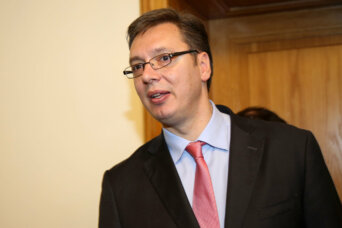- About
- Topics
- Picks
- Audio
- Story
- In-Depth
- Opinion
- News
- Donate
-
Signup for our newsletterOur Editors' Best Picks.Send
Read, Debate: Engage.
| topic: | Health and Sanitation |
|---|---|
| located: | Serbia, Bosnia and Herzegovina |
| editor: | Katarina Panić |
Two days ago, a plane of the Serbian government landed at the Sarajevo airport. Populist president Aleksandar Vučić wanted to personally hand 10,000 doses of the AstraZeneca vaccine to the Federation - a part of Bosnia and Herzegovina which hadn’t started the inoculation process yet due to delayed shipments from COVAX, the international scheme established to help poor countries get access to COVID-19 vaccines.
As none of the European nations outside of the European Union have got any of these vaccines, they turned to friends from the East for help.
Not only is Serbia the second-top country in Europe in terms of vaccination per capita, right after the United Kingdom, but it had already made similar deliveries to its neighbours - North Macedonia and Montenegro. It also donated vaccines to Republika Srpska, a Serb-dominated region of Bosnia. Medical staff from the area even got to travel regularly to Serbia to get the vaccine they prefer.
Serbia’s citizens can choose between China’s Sinopharm, Russia’s Sputnik V, the Pfizer-BioNTech or AstraZeneca. This last one, President Vučić brought to Sarajevo, but it turned out to be a problem for Bosnia’s foreign minister, Bisera Turković, who said the vaccines were produced in India and that they are bad, cheap, and inferior to those that AstraZeneca makes for rich countries.
“We should be careful,” she added.
The pharma company rejected these claims and local analysts in Bosnia accused the authorities of failing to procure the vaccines.
“Her statement is stupid and unneeded,” a Serb member of the multi-ethnic Bosnian Presidency, Milorad Dodik, told the media.
The very same day, COVAX published the list of the first round of allocations. Bosnia had previously threatened to sue the programme unless its vaccines arrived as agreed - 1.2 million from COVAX and 900,000 from the EU.
“We have expected vaccines from the EU; we didn’t get them. We will thank them when we receive vaccines from the COVAX programme,” the Serbian President told reporters in Sarajevo.
However, his visit to Bosnia provoked a dispute over the question of whether the country should accept the donation from its former enemy, as Reuters put it in its headline, referring to the war in the early nineties after the breakup of the former Yugoslavia.
“I know that this will cause various caustic comments, but I would ask people to think about one thing: if even one of these vaccines saves a life, then it’s worth it,” a Croat member of the Presidency Željko Komšić stated.
The Balkans: a place where even health issues awaken the spirits of the past.
Image: Franz Johann Morgenbesser.

